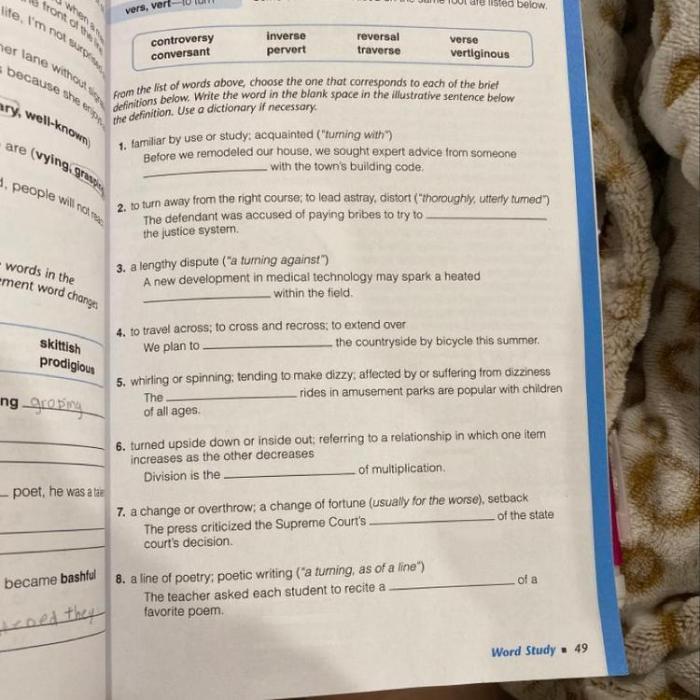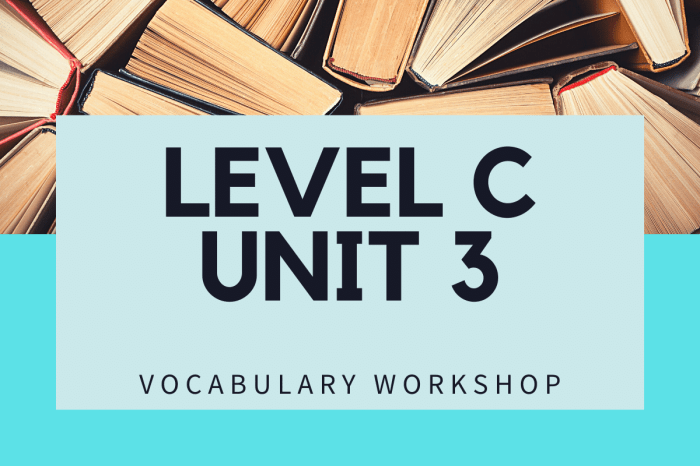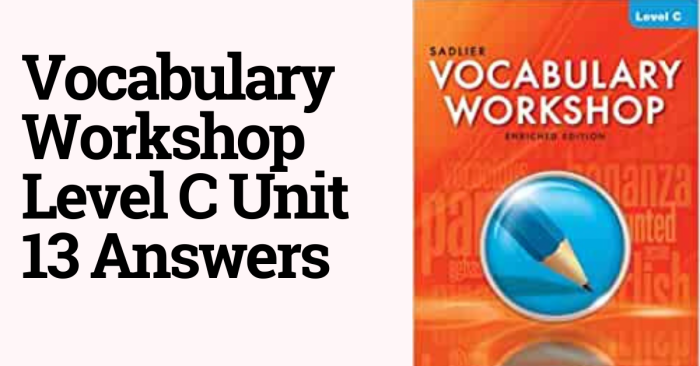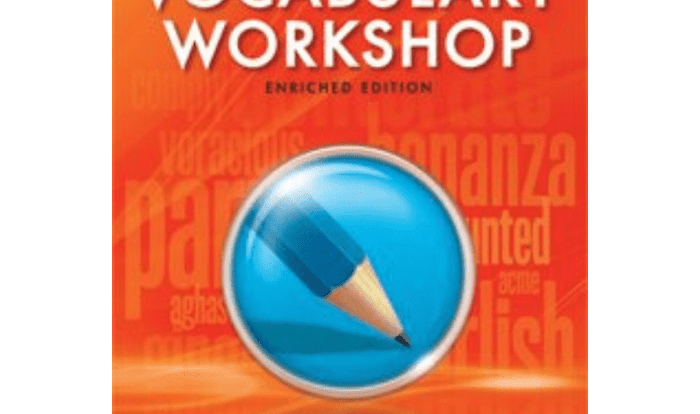Unit 3 Vocabulary Workshop Level C Answers presents a comprehensive resource for students seeking to expand their vocabulary. This meticulously crafted guide provides an in-depth exploration of essential vocabulary words, their definitions, and their usage in various contexts.
Through a series of engaging activities, sentence examples, and word games, this workshop empowers learners to master new words effectively. By understanding the nuances of word relationships and the impact of context on meaning, students gain a deeper comprehension of language and enhance their communication skills.
Vocabulary Workshop Level C: Unit 3: Unit 3 Vocabulary Workshop Level C Answers

Unit 3 dari Vocabulary Workshop Level C mencakup berbagai aspek pembelajaran kosa kata, termasuk daftar kata dan definisi, contoh kalimat, hubungan kata, penggunaan kata dalam konteks, analisis kata, permainan dan aktivitas kata, penilaian kosa kata, dan strategi pengembangan kosa kata.
Vocabulary Words and Definitions
- Abrogate(verb): To repeal or annul a law or treaty.
- Benevolent(adjective): Showing kindness and good will.
- Conciliatory(adjective): Intended to restore harmony or goodwill.
- Egregious(adjective): Conspicuously bad or offensive.
- Fastidious(adjective): Excessively concerned with cleanliness and order.
- Gregarious(adjective): Fond of company and social interaction.
- Iconoclast(noun): A person who attacks cherished beliefs or institutions.
- Juxtapose(verb): To place side by side for comparison or contrast.
- Loquacious(adjective): Talkative or verbose.
- Magnanimous(adjective): Generous or forgiving in nature.
Sentence Examples
- The government abrogatedthe treaty due to ongoing violations.
- The teacher’s benevolentnature made her a favorite among students.
- The diplomat’s conciliatoryspeech helped ease tensions between the nations.
- The politician’s egregiousbehavior caused widespread outrage.
- The inspector was fastidiousabout the cleanliness of the kitchen.
- The gregariouschild quickly made friends in the new neighborhood.
- The iconoclastchallenged traditional beliefs and customs.
- The author juxtaposedthe characters’ different perspectives to highlight their conflict.
- The professor’s loquaciouslecture kept the students entertained for hours.
- The king’s magnanimouspardon granted mercy to the rebels.
Word Relationships
- Synonyms:Abrogate – repeal, annul; Benevolent – kind, charitable; Conciliatory – appeasing, soothing; Egregious – outrageous, flagrant; Fastidious – meticulous, finicky; Gregarious – sociable, extroverted; Iconoclast – dissenter, rebel; Juxtapose – contrast, compare; Loquacious – talkative, verbose; Magnanimous – generous, forgiving.
- Antonyms:Abrogate – establish, enact; Benevolent – malevolent, cruel; Conciliatory – confrontational, hostile; Egregious – trivial, insignificant; Fastidious – sloppy, careless; Gregarious – solitary, introverted; Iconoclast – conformist, traditionalist; Juxtapose – separate, isolate; Loquacious – taciturn, reserved; Magnanimous – vengeful, unforgiving.
Word Usage in Context
- The president’s abrogationof the trade agreement sent shockwaves through the business community.
- The benevolentorganization provided food and shelter to the homeless.
- The politician’s conciliatorytone helped to defuse the heated debate.
- The student’s egregiousbehavior warranted severe punishment.
- The housekeeper’s fastidiousattention to detail ensured the mansion was spotless.
- The gregarioushost welcomed guests with open arms.
- The historian was an iconoclastwho challenged the established narrative.
- The writer juxtaposedthe protagonist’s past and present to reveal their inner conflict.
- The teacher’s loquaciousnature made it difficult for students to concentrate.
- The king’s magnanimousgesture granted pardon to the rebels who had fought against him.
Word Analysis
- Abrogate:Root word “rog” (ask) + prefix “ab” (away). Meaning: To ask away or annul.
- Benevolent:Root word “bene” (good) + suffix “olent” (full of). Meaning: Full of goodness or kindness.
- Conciliatory:Root word “con” (with) + “cilia” (lashes) + suffix “tory” (relating to). Meaning: Relating to the act of bringing together or appeasing.
- Egregious:Root word “ex” (out) + “greg” (flock) + suffix “ous” (full of). Meaning: Full of flocking or outrageous behavior.
- Fastidious:Root word “fastidi” (disgust) + suffix “ous” (full of). Meaning: Full of disgust or excessive concern with cleanliness.
- Gregarious:Root word “greg” (flock) + suffix “ous” (full of). Meaning: Full of flocking or social interaction.
- Iconoclast:Root word “icon” (image) + “clast” (breaker). Meaning: One who breaks images or cherished beliefs.
- Juxtapose:Root word “jux” (near) + “pos” (put) + suffix “e” (to make). Meaning: To make near or place side by side.
- Loquacious:Root word “loqui” (to speak) + suffix “acious” (full of). Meaning: Full of speaking or talkative.
- Magnanimous:Root word “magna” (great) + “animus” (mind). Meaning: Having a great mind or being generous and forgiving.
Word Games and Activities, Unit 3 vocabulary workshop level c answers
- Vocabulary Charades:Write down vocabulary words on slips of paper and have students take turns acting them out while others guess.
- Word Jumbles:Scramble the letters of vocabulary words and have students unscramble them to reveal the correct words.
- Synonym and Antonym Match:Write down vocabulary words and their synonyms and antonyms on separate cards. Have students match the cards to create pairs.
Vocabulary Assessment
- Multiple Choice:Select the best definition for the underlined vocabulary word in the sentence.
- Fill-in-the-Blank:Complete the sentence with the correct vocabulary word.
- Short Answer:Explain the meaning of the vocabulary word and provide an example of its usage.
Vocabulary Building Strategies
- Read Extensively:Engage in regular reading of various texts to encounter new words and reinforce existing ones.
- Use Flashcards:Create flashcards with vocabulary words on one side and definitions on the other for easy memorization.
- Play Word Games:Participate in word games such as crosswords, Scrabble, and Bananagrams to improve vocabulary retention.
- Keep a Vocabulary Journal:Note down new words encountered in readings and conversations, along with their definitions and examples.
FAQ Summary
What is the purpose of Unit 3 Vocabulary Workshop Level C Answers?
Unit 3 Vocabulary Workshop Level C Answers aims to enhance students’ vocabulary skills by providing definitions, usage examples, and engaging activities.
How does this workshop help students learn vocabulary?
The workshop employs various techniques, including sentence examples, word games, and analysis, to facilitate effective vocabulary learning.
What types of activities are included in the workshop?
The workshop features a range of activities, such as word games, vocabulary assessments, and exercises that focus on word relationships and usage in context.


